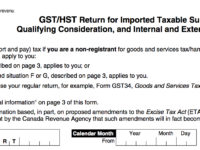Digital tax has emerged as one of the most contentious Canadian digital issues with groups advocating for a wide range of new enforcement or policy measures including digital sales tax, taxes on online video services, income taxes on digital companies, tax measures in support of media organizations, Internet access taxes, and digital device taxes. Unfortunately, the debate is often muddled by the use of the same terms, creating considerable confusion. For example, references to “Netflix taxes” have been used with regard to digital sales tax on Netflix, mandated Canadian content contributions for Internet services such as Netflix, and income taxes payable by Netflix.
This blog series will attempt to unpack digital tax debate. The series begins with digital sales taxes, which was back in the news earlier this month when Finance Minister Bill Morneau confirmed that Canada is awaiting an international agreement on digital sales taxes before implementing any domestic reforms. Morneau indicated the government would support a quick resolution of the issue – the current deadline is 2020 – but that a provincial digital sales tax in Quebec will not spark a matching federal tax until the global issues are resolved.











